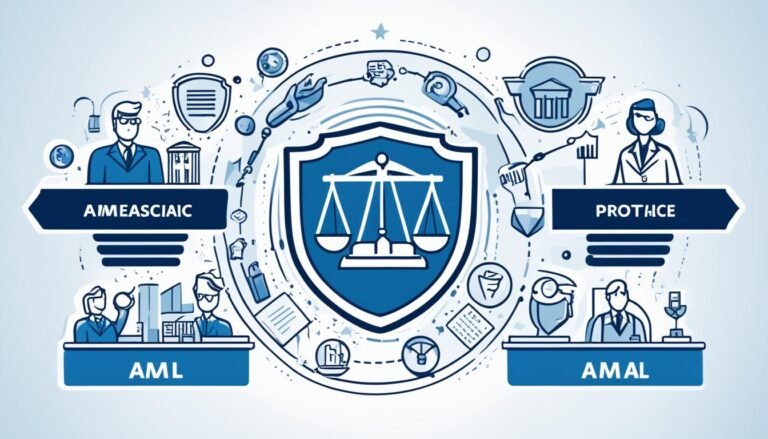Compliance Audits in Finance: Your Key Guide
Did you know that in the finance industry, regulatory compliance audits are conducted every year to ensure adherence to laws and regulations?
Compliance audits play a crucial role in the financial sector, where accuracy, transparency, and adherence to regulatory requirements are paramount. These audits evaluate the effectiveness of internal controls and processes, ensuring that financial institutions and organizations meet the necessary standards and regulations.
Whether it’s a large bank or a small financial services provider, compliance audits are an essential part of maintaining trust, credibility, and operational efficiency in the industry. In this article, we will dive deeper into compliance audits in finance, exploring the requirements, importance, and different types of audits within the financial sector. Let’s explore the world of compliance audits in finance and unravel the intricacies of regulatory compliance.
Key Takeaways:
- Compliance audits in finance are conducted annually to ensure adherence to laws and regulations.
- These audits play a crucial role in maintaining trust, credibility, and operational efficiency in the financial industry.
- Compliance audits evaluate the effectiveness of internal controls and processes within financial institutions.
- Understanding compliance audit requirements is essential for organizations in the financial sector.
- Different types of compliance audits exist within the financial industry, catering to specific regulatory obligations.
What is a Compliance Audit?
A compliance audit is an independent evaluation to ensure that an organization adheres to external laws, rules, and regulations, or internal guidelines. It also confirms conformity to agreements, such as accepting government funding.
Areas Covered in Compliance Audits
Compliance audits are not limited to financial audits. They cover a wide range of areas, including:
- IT and security audits
- HR compliance
- Quality management systems
Noncompliance with regulatory standards can result in penalties, fines, and damage to an organization’s reputation. That’s why organizations need to conduct compliance audits to ensure they follow the necessary controls and policies.
Who Conducts Compliance Audits?
Compliance audits can be conducted by various individuals, such as:
- Internal auditors: Employees within the organization who assess adherence to laws and regulations.
- Certified public accountants: External auditors specializing in accounting and financial compliance.
- Third-party auditors: Independent professionals hired to evaluate compliance with specific standards.
- Government auditors: Auditors from regulatory bodies who ensure compliance with laws and regulations.
Auditors may seek expert advice from specialists such as lawyers to ensure comprehensive evaluations.
| Key Points |
|---|
| A compliance audit evaluates an organization’s adherence to laws, regulations, and agreements. |
| It covers areas beyond financial audits, including IT and security, HR compliance, and quality management systems. |
| Noncompliance can lead to penalties, fines, and reputational damage. |
| Audit can be conducted by internal auditors, third-party auditors, certified public accountants, or government auditors. |
Importance of Compliance Audits in Business
Compliance audits play a vital role in ensuring that businesses adhere to rules, regulations, and standards set by regulatory authorities. These audits are essential for maintaining regulatory compliance, mitigating risks, and improving operational efficiency. Let’s explore the various reasons why compliance audits are crucial for businesses:
1. Regulatory Compliance
Compliance audits help organizations ensure that they follow all relevant laws, regulations, and industry-specific standards. By staying compliant, businesses avoid penalties, fines, and legal implications. This not only protects the financial well-being of the organization but also maintains its reputation and credibility in the market.
2. Risk Management
Conducting compliance audits enables businesses to identify potential risks and vulnerabilities. By proactively addressing these risks, organizations can implement effective risk management strategies and minimize the likelihood of compliance breaches. This helps protect the company from financial losses, reputation damage, and other adverse consequences.
3. Operational Efficiency
Compliance audits assess the effectiveness of internal controls and processes. By identifying areas of noncompliance or inefficiency, businesses can make necessary improvements to enhance their operational efficiency. This leads to streamlined workflows, optimized resource allocation, and overall improved performance.
4. Financial Accuracy
Compliance audits focus on financial reporting and accuracy. These audits validate the accuracy and reliability of financial information, ensuring that businesses adhere to accounting standards and regulations. Accurate financial reporting enables better decision-making, strengthens investor confidence, and maintains transparency in financial operations.
5. Trust and Credibility
Compliance audits help businesses build trust and credibility among stakeholders, including customers, partners, and investors. By demonstrating a commitment to ethical practices and regulatory compliance, organizations gain credibility and establish themselves as reliable entities in the market. This, in turn, enhances business relationships and fosters long-term trust.
6. Compliance with HR Policies
Compliance audits also encompass HR policies and practices. These audits ensure that organizations comply with labor laws, equal employment opportunity guidelines, and other HR-related regulations. Adhering to HR policies promotes employee well-being, fair treatment, and a positive work environment.
7. Confidentiality Protection
Compliance audits place a strong emphasis on safeguarding confidential information. These audits ensure that businesses have strong data protection measures in place to protect sensitive data from unauthorized access, breaches, or data leaks. By prioritizing confidentiality protection, organizations maintain the trust of their customers and reduce the risk of reputational damage.
8. Management Standards
Compliance audits evaluate whether businesses adhere to management standards and frameworks. These audits assess the organization’s governance processes, ethical standards, and internal controls. Adhering to management standards ensures that businesses operate with integrity, accountability, and good corporate governance practices.
Overall, compliance audits are instrumental in ensuring that businesses operate within the boundaries of regulatory requirements, manage risks effectively, and strive for operational excellence. By prioritizing compliance, organizations can enhance their reputation, maintain financial accuracy, and build trust with stakeholders.
| Compliance Audits | Internal Audits |
|---|---|
| Focused on ensuring adherence to external laws, regulations, and standards. | Assess adherence to internal controls, processes, and guidelines. |
| Conducted by independent or third-party auditors. | Performed by internal auditors employed by the organization. |
| Objective is to validate compliance efforts and identify areas of noncompliance. | Provide insights into the organization’s operations and identify gaps in internal controls. |
| Focuses on demonstrating compliance with regulatory requirements. | Primarily ensures adherence to internal policies and guidelines. |
| Helps organizations build trust and maintain credibility with external stakeholders. | Aids in improving internal processes and controls for efficient operations. |
Different Types and Regulations of Compliance Audits
Compliance audits encompass various types and regulations that organizations must adhere to. These audits ensure compliance with specific standards and guidelines relevant to different industries and sectors. Let’s explore some of the key types of compliance audits:
1. ISO Compliance Audit
An ISO compliance audit evaluates an organization’s adherence to the ISO/IEC 27K series, which focuses on information security management systems. This audit assesses whether the organization has implemented the necessary controls and processes to protect sensitive information from unauthorized access, alteration, or disclosure.
2. SOX Compliance Audit
A SOX compliance audit verifies that publicly traded companies comply with the Sarbanes-Oxley Act. This audit primarily focuses on financial records and operational controls to ensure accuracy, transparency, and accountability in financial reporting.
3. HIPAA Compliance Audit
The purpose of a HIPAA compliance audit is to ensure that healthcare providers and organizations handling protected health information (PHI) comply with the Health Insurance Portability and Accountability Act (HIPAA). This audit assesses data security measures, privacy practices, and breach response protocols to safeguard patient information.
4. PCI DSS Compliance Audit
A PCI DSS compliance audit verifies that organizations comply with the Payment Card Industry Data Security Standard (PCI DSS). This audit ensures that businesses securely store, process, and transmit credit card information to protect against data breaches and fraud.
5. Compliance Audits for Government Entities
Government entities, such as federal agencies and local municipalities, undergo compliance audits to ensure adherence to specific regulations and legal requirements. These audits assess whether government organizations comply with financial, operational, and programmatic standards.
6. Compliance Audits for Federal Contractors
Federal contractors are subject to compliance audits that evaluate their adherence to regulations, such as the Federal Acquisition Regulation (FAR), which governs government contract requirements. These audits verify that contractors meet contractual obligations, maintain proper accounting practices, and comply with specific performance metrics.
7. Healthcare Compliance Audits
Healthcare compliance audits assess compliance with industry-specific regulations, including those related to patient privacy (HIPAA), billing and coding (CMS guidelines), and quality of care (accreditation standards). These audits help healthcare organizations maintain regulatory compliance and deliver high-quality services.
8. Financial Compliance Audits
Financial compliance audits focus on ensuring the accuracy and transparency of financial statements, as well as the adequacy of internal controls and reporting processes. These audits verify compliance with accounting standards, tax regulations, and industry-specific financial rules.
Each type of compliance audit requires specific considerations and evaluation criteria, tailored to the relevant regulations and standards. Organizations must understand the requirements of each audit to effectively prepare for and undergo the compliance auditing process.
| Type of Compliance Audit | Regulations |
|---|---|
| ISO Compliance Audit | ISO/IEC 27K series for information security |
| SOX Compliance Audit | Sarbanes-Oxley Act for financial controls |
| HIPAA Compliance Audit | Health Insurance Portability and Accountability Act for protecting patient information |
| PCI DSS Compliance Audit | Payment Card Industry Data Security Standard for credit card data protection |
| Compliance Audits for Government Entities | Applicable government regulations and legal requirements |
| Compliance Audits for Federal Contractors | Federal Acquisition Regulation (FAR) and contractual obligations |
| Healthcare Compliance Audits | Industry-specific regulations, such as HIPAA, CMS guidelines, and accreditation standards |
| Financial Compliance Audits | Accounting standards, tax regulations, and industry-specific financial rules |
Compliance Audit vs. Internal Audit
In the world of business evaluations, compliance audits and internal audits have distinct purposes. While internal audits focus on assessing an organization’s adherence to its own internal codes, controls, and processes, compliance audits evaluate compliance with external laws, regulations, and industry-specific frameworks.
Internal audits primarily ensure that an organization’s internal controls and processes are aligned with its own internal standards and guidelines. They provide insights into the organization’s operations, allowing for continuous improvement and risk mitigation.
On the other hand, compliance audits are conducted to evaluate an organization’s adherence to external obligations and regulations. These audits provide objective evaluations of compliance with laws, regulations, and industry frameworks, such as ISO standards. Compliance audits are essential for organizations to demonstrate their commitment to meeting external requirements.
Both compliance audits and internal audits can be performed by the same individuals, but they serve different objectives. Internal audits focus on improving internal processes, enhancing operational efficiency, and identifying gaps in internal controls. Compliance audits, on the other hand, help organizations align their practices with external laws, regulations, and standards, building trust and credibility with stakeholders.
Ultimately, the combination of internal audits and compliance audits enables organizations to uphold internal controls and processes while ensuring adherence to external compliance requirements and regulations.
By prioritizing both internal and compliance audits, organizations can enhance their risk management practices, improve operational efficiency, and establish a culture of continuous improvement.
Internal Controls and Adherence to Internal Codes
Internal audits focus on evaluating an organization’s internal controls and ensuring adherence to internal codes and guidelines. These audits provide valuable insights into operational efficiency, risk mitigation, and overall performance. By conducting internal audits, organizations can identify gaps in internal controls and take necessary steps to strengthen them.
Objective Evaluations of Adherence to External Laws and Regulations
Compliance audits are designed to assess an organization’s compliance with external laws, regulations, and industry frameworks. These audits provide objective evaluations and determine whether the organization is meeting its obligations and responsibilities. Compliance audits play a crucial role in ensuring organizational compliance and maintaining trust with external stakeholders.
Alignment with Industry-Specific Frameworks
Compliance audits provide organizations with an opportunity to align their practices with industry-specific frameworks and standards. This alignment ensures that the organization meets the requirements set by regulatory bodies and industry associations, fostering a culture of compliance and best practices.
“Compliance audits help organizations align their practices with external laws, regulations, and industry frameworks, building trust and credibility with stakeholders.”
Purpose and Objectives of Compliance Audits
Compliance audits serve a crucial purpose in assessing an organization’s adherence to target frameworks and regulatory requirements. They play a vital role in mitigating risks, building trust with stakeholders, and driving continuous improvement. Compliance audits deliver various outcomes, including audit opinions, certifications, reports, or assessments that provide valuable insights for management and strategy development.
Objectives of Compliance Audits
The primary objectives of compliance audits are:
- To evaluate an organization’s compliance with external laws, regulations, and industry standards.
- To identify areas of noncompliance and potential risks that may impact the organization.
- To provide recommendations for management to strengthen compliance efforts and improve processes.
- To assess the effectiveness of internal controls and systems in place.
- To foster continuous improvement and ensure ongoing compliance with evolving regulatory requirements.
Compliance audits aim to establish a solid foundation for trust-building with stakeholders, such as customers, investors, and regulators. By demonstrating a commitment to regulatory compliance, organizations can mitigate risks and safeguard their reputation and credibility.
Compliance Audit Deliverables
Compliance audits produce various deliverables that contribute to organizational transparency and accountability. These deliverables include:
- Audit Opinions: Summaries of the audit findings and conclusions.
- Certification Standards: Proof of compliance with specific regulatory standards or industry-specific certifications.
- Reports and Assessments: Comprehensive documentation highlighting areas of compliance and noncompliance, along with recommendations for improvement.
- Recommendations for Management: Actionable insights to enhance compliance efforts, strengthen internal controls, and align with best practices.
These deliverables enable organizations to gain a comprehensive understanding of their compliance status and take proactive steps towards continuous improvement.
Difference Between Internal Audit and Compliance Audit
When it comes to evaluating an organization’s adherence to controls, processes, and regulations, two types of audits come into play: internal audits and compliance audits. While both serve important purposes in assessing an organization’s operations, they have distinct differences in terms of who performs the audit, the focus of the audit, and the intended outcomes.
Internal Audits:
Internal audits are conducted by internal auditors who are employed by the organization itself. These auditors have an in-depth understanding of the organization’s structure, controls, and processes. The primary focus of internal audits is to evaluate and provide assurance on the effectiveness of internal controls, risk management, and governance processes. They aim to identify potential gaps in controls, assess the organization’s adherence to internal guidelines, and provide recommendations for improvement.
Internal audits are valuable for organizations as they help enhance internal processes, minimize risks, and ensure operational efficiency. By having internal auditors who are familiar with the organization’s operations, it enables a deeper understanding of the organization’s objectives and the effectiveness of its internal controls.
Compliance Audits:
On the other hand, compliance audits are performed by independent or third-party auditors who are experts in assessing an organization’s adherence to external laws, regulations, and frameworks. Compliance audits focus on ensuring that the organization meets compliance requirements set forth by regulatory bodies or industry-specific standards.
The objective of compliance audits is to validate the organization’s compliance efforts by assessing its adherence to external obligations. These audits aim to identify any gaps in compliance, assess the effectiveness of controls in place, and ensure that the organization is following the required protocols. Compliance auditors provide an unbiased assessment, free from internal biases or conflicts of interest, ensuring objectivity in the evaluation.
By outsourcing compliance audits to external auditors, organizations can benefit from their expertise and unique perspectives. This independent evaluation adds value by validating the organization’s compliance efforts and providing recommendations for remediation, if necessary.
It is worth noting that internal audits and compliance audits are not mutually exclusive. In fact, they can complement each other when integrated into the organization’s operations. Internal audits can help identify gaps and prepare the organization for compliance audits, while compliance audits verify and validate the organization’s compliance efforts. By integrating both types of audits, organizations can enhance their overall risk management and governance through an integrated risk program.
| Aspect | Internal Audit | Compliance Audit |
|---|---|---|
| Auditor | Internal auditors employed by the organization | Independent or third-party auditors |
| Focus | Internal controls, processes, and risk management | Adherence to external laws, regulations, and frameworks |
| Objective | Evaluate internal controls and processes | Validate compliance efforts, provide objectivity |
| Value-add | Identify gaps, improve internal processes | Verify compliance, provide expert recommendations |
| Integration | Part of overall risk management and governance | Part of the organization’s compliance program |
Different Types of Compliance Audits
Compliance audits come in various types, tailored to specific industries, sectors, regulatory requirements, and contractual obligations. These audits serve as essential tools for organizations to ensure adherence to compliance standards and maintain regulatory compliance.
Mandatory Compliance Audits
Mandatory compliance audits are specific to certain organizations and industries, necessitating compliance with specific requirements. For instance, publicly traded companies are required to comply with Sarbanes-Oxley (SOX) regulations, which focus on financial reporting and internal controls. Healthcare providers must adhere to the Health Insurance Portability and Accountability Act (HIPAA) regulations to safeguard patient confidentiality and data security.
Industry-Specific Audits
Industry-specific audits cater to the unique compliance needs of particular sectors. For example, financial organizations undergo Financial Industry Regulatory Authority (FINRA) audits to ensure compliance with financial industry regulations. Government agencies are subjected to Federal Information Security Management Act (FISMA) audits, verifying compliance with information security standards.
Regulatory Compliance Audits
Regulatory compliance audits focus on aligning organizations with relevant regulations, standards, and frameworks. These audits aim to ensure compliance with regulatory requirements such as the European Union’s General Data Protection Regulation (GDPR), which safeguards individual data privacy rights. They verify adherence to specific industry regulations, quality standards, or cybersecurity protocols.
SOC Audits
System and Organization Controls (SOC) audits assess an organization’s control environment, focusing on financial reporting, data security, availability, processing integrity, confidentiality, and privacy. SOC audits are conducted by certified public accountants (CPAs) to evaluate the effectiveness of an organization’s internal controls.
ISO 27001 Audits
ISO 27001 audits evaluate an organization’s information security management system (ISMS) against the International Organization for Standardization (ISO) 27001 standards. These audits ensure that an organization has implemented and maintains effective information security controls to protect sensitive data and mitigate cybersecurity risks.
| Compliance Audit Type | Regulation/Framework | Target Organizations |
|---|---|---|
| Sarbanes-Oxley (SOX) Audit | Financial reporting and controls | Publicly traded companies |
| HIPAA Audit | Healthcare data protection | Healthcare providers |
| FINRA Audit | Financial industry regulations | Financial organizations |
| FISMA Audit | Information security | Government agencies |
| GDPR Audit | Data protection and privacy | Organizations handling EU citizens’ data |
| SOC Audit | Internal controls and security | Various organizations |
| ISO 27001 Audit | Information security management | Organizations implementing ISMS |
Other Compliance Audits
In addition to the above audits, various other compliance audits exist to address specific industry or regulatory requirements. These audits cater to sectors such as banking, insurance, energy, telecommunications, and manufacturing, among others.
Organizations must identify the relevant compliance audits that align with their industry, sector, and contractual obligations to fulfill their compliance requirements effectively.
How to Successfully Navigate a Compliance Audit
Successfully navigating a compliance audit requires thorough readiness and internal preparation. Organizations must ensure that their internal controls and processes align with the target regulations and frameworks to demonstrate compliance. Adequate evidence and documentation should be gathered and made readily available to support the organization’s compliance efforts. During the audit, interviews, document reviews, and demonstrations of adherence to regulations may be conducted to validate compliance.
It is crucial for organizations to embrace a culture of continuous improvement and maintain robust remediation plans. This enables them to address any gaps or areas of noncompliance identified during the audit effectively. Compliance audits should be viewed as opportunities for growth and improvement in governance, risk, and compliance practices.
Conclusion
Compliance audits serve as a vital tool for organizations to ensure they meet regulatory requirements and adhere to laws and frameworks. By conducting compliance audits, businesses can effectively manage risks, build trust and credibility, and achieve operational efficiency. These audits play a crucial role in identifying areas of noncompliance, enabling organizations to address them promptly and improve their processes.
Moreover, compliance audits contribute to maintaining financial accuracy and demonstrating a commitment to continuous improvement. By integrating compliance practices into their operations, organizations can navigate the complexities of regulatory requirements successfully. This not only helps them thrive in a highly regulated environment, but it also enhances their reputation and instills confidence among stakeholders.
Ultimately, compliance audits are an indispensable aspect of organizational governance, risk mitigation, and building trust. By recognizing the importance of compliance and leveraging the insights gained from compliance audits, organizations can establish themselves as reliable entities, mitigating risks, and continuously improving their operations.







